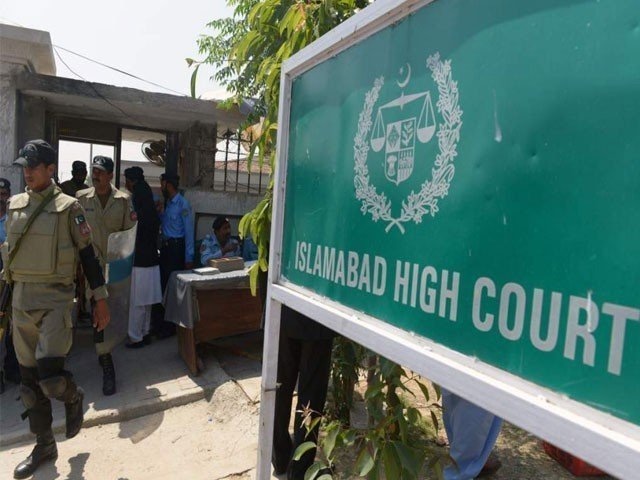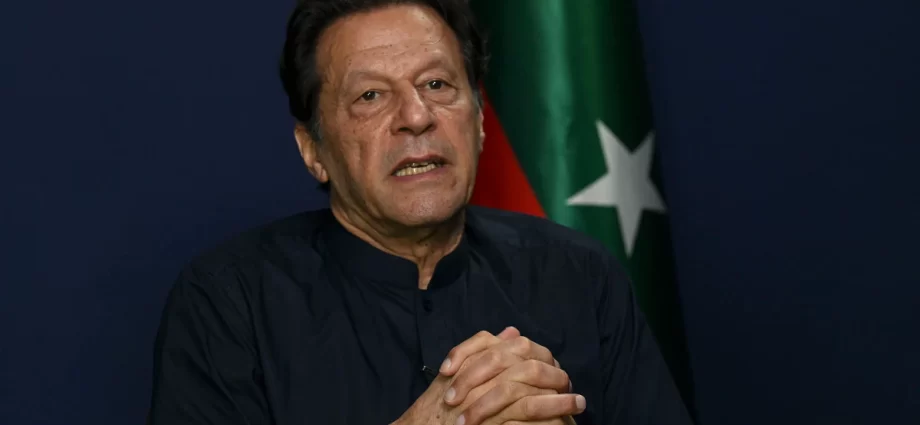
CJ IHC Aamer Farooq to hear Chairman PTI’s post-bail application in cipher case tomorrow
Imran Khan filed the petition through his lawyer Barrister Salman Safdar. The State and Interior Ministry Secretary Yousuf Naseem Khokar are respondents in the case.
The petition urged the IHC to grant Imran Khan post-arrest bail till the final disposal of the cipher case “to meet the ends of justice”.
ISLAMABAD ( Web News )
Imran Khan, the Chairman of Pakistan Tehreek-e-Insaf (PTI) and former prime minister, Saturday filed a bail petition at the Islamabad High Court (IHC) challenging the special court’s decision in the cipher case.
The plea by Imran Khan, who was removed from office through a no-confidence motion in April last year, has been fixed for hearing tomorrow (Monday) before Chief Justice Islamabad High Court Aamer Farooq.
On Saturday, Imran Khan filed the petition through his lawyer Barrister Salman Safdar. The State and Interior Ministry Secretary Yousuf Naseem Khokar are respondents in the case.
The petition urged the IHC to grant Imran Khan post-arrest bail till the final disposal of the cipher case “to meet the ends of justice”.
The plea claimed that nearly 200 criminal cases have been filed against the former premier, out of which “almost 40 cases are [on] charges of corruption, murder, sedition, mutiny, foreign funding, NAB (National Accountability Bureau) reference and Toshakhana reference”.
It argued that the PTI chief could not avail remedy under section 498 (power to direct admission to bail or reduction of bail) of the Code of Criminal Procedure (CrPC).
The petition alleged that the Federal Investigation Agency (FIA) operated at the behest of the then interior ministry. It added that the matter of the case not being registered by the foreign ministry had gone unnoticed by Special Judge Abual Hasnat Zulqarnain.
“Never before, history has witnessed the ‘arrest’ and ‘prosecution’ of a former prime minister (Imran) and a former foreign minister (Qureshi) under this law (Secrets Act),” the plea stated.
It went on to cite past verdicts to argue that “straightaway arrests have been condemned in landmark authoritative judgments”. The petition asserts that the Secrets Act was “originally enacted to hold members of the armed forces (air, navy, army) accountable for violations and breaches of the law”.
It contended that neither section 5 (wrongful communication, etc of information) nor section 9 (attempts, incitements, etc) of the Official Secrets Act were applicable in the cipher case, and neither does the law have “any remote relevance to the allegations detailed in the FIR”.
The petition further stated that former interior minister Rana Sanaullah and the FIA have made “contradictory statements”, according to which, the “original cipher document is securely held in the custody of the Ministry of Foreign Affairs”.
“The petitioner’s primary concern was to prevent foreign interference in domestic political affairs,” it said.
The plea went on to allege, “This is another like attempt, made by the state functionaries, to secure the straightway arrest of the petitioner after suspension of his sentence in Toshakhana reference.”.
It further said that the respondents’ acts depict “clear mala fide, hostility, and vindictive motives to harm the petitioner in his office, career, person, reputation, and dignity”.
The plea stated that the petitioner was ready to furnish reasonable surety to the entire satisfaction of the court and also undertook “not to abscond or tamper with the prosecution witnesses”.
Asserting that the PTI chief is “one of the few honest and dignified statesmen of Pakistan”, the petition recalled Imran’s cricket career and philanthropic contributions.
It went on to contend that his “mandate and growing popularity it got from the masses became a threat to the already well-established political forces”. The plea added that state machinery was being misused with the sole objective of “political victimisation and score-settling”.
The special court — established under the Official Secrets Act and hearing the case registered against the PTI chief and his party’s Vice Chairman Makhdoom Shah Mahmood Qureshi — had recently rejected the post-arrest bail applications of Khan and the senior politician, following the conclusion of arguments presented by PTI lawyers on Thursday.
The court, on Wednesday, extended Imran Khan and Shah Mahmood Qureshi’s judicial remand till September 26 in the cipher case.
Last month, the FIA booked PTI chief and his party’s vice chairman under the Official Secrets Act for allegedly misplacing and misusing the classified document for vested political interests.
Subsequently, both leaders were arrested in connection with the investigation into the case and a special court was established under the Official Secrets Act to try the accused.
The same day, the special court approved PTI leader Asad Umar’s bail in the case related to US cipher after a prosecutor told the judge that his arrest was not required at this stage.
The Special Court judge Abual Hasnat Muhammad Zulqarnain approved the PTI leader’s bail against the surety bond of Rs50,000 and also noted that Umar expressed willingness to join the cipher probe but the prosecution did not investigate him in the case.
“If Asad Umar’s arrest is required, the FIA [Federal Investigation Agency] will proceed according to law,” the judge ordered.
He also directed the FIA to inform the PTI leader in advance before arresting him in the case.
The controversy first emerged on March 27, 2022, when Khan — just days before his ouster in April 2022 — brandished a letter, claiming that it was a cipher from a foreign nation, which mentioned that his government should be removed from power.
He did not reveal the contents of the letter nor mention the name of the nation that had sent it. But a few days later, he named the United States and said that Assistant Secretary of State for South and Central Asia Affairs Donald Lu had sought his removal.
The cipher was about former Pakistan ambassador to the US Asad Majeed’s meeting with Lu.
The former prime minister, claiming that he was reading contents from the cipher, said that “all will be forgiven for Pakistan if Imran Khan is removed from power”.
Then on March 31, the National Security Committee (NSC) took up the matter and decided to issue a “strong demarche” to the country for its “blatant interference in the internal affairs of Pakistan”.
Later, after his removal, Khan’s successor Shehbaz Sharif convened another meeting of the NSC, which came to the conclusion that it had found no evidence of a foreign conspiracy in the cipher.
The cipher case against the former premier became serious after his principal secretary Azam Khan stated before a magistrate as well as the Federal Investigation Agency (FIA) that the former PM had used the US cipher for his “political gains” and to avert a vote of no-confidence against him.
The former bureaucrat, in his confession, said when he provided the ex-premier with the cipher, he was “euphoric” and termed the language a “US blunder”. The former prime minister, according to Azam, then said that the cable could be used for “creating a narrative against establishment and opposition”.
Azam said the US cipher was used in political gatherings by the PTI chairman, despite his advice to him to avoid such acts. He mentioned that the former prime minister also told him that the cipher could be used to divert the public’s attention towards “foreign involvement” in the opposition’s no-confidence motion.

